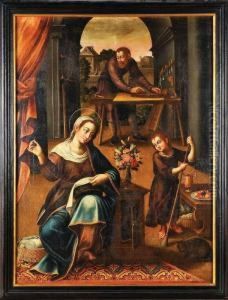Antonio Vieira Paintings
Antonio Vieira was a notable Portuguese Jesuit priest, preacher, diplomat, and writer of the 17th century. Born on February 6, 1608, in Lisbon, Portugal, Vieira had a significant influence on the religious, political, and literary aspects of both Portugal and Brazil. His parents were Cristóvão Vieira Ravasco and Maria de Azevedo. In 1614, Vieira's family moved to Bahia, Brazil, where he would later join the Society of Jesus at the age of 15 and began his novitiate at the Jesuit college in Salvador.
Vieira was recognized for his prodigious talent as an orator early on. His sermons combined a profound understanding of biblical texts with a keen awareness of contemporary issues and human psychology. Vieira's ability to blend religious doctrine with rhetorical flair made his sermons widely celebrated, and he became a preacher to the royal court in Lisbon.
Throughout his life, Vieira was an advocate for the rights of indigenous peoples in Brazil and argued against their enslavement. His work 'História do Futuro' and 'Clavis Prophetarum' demonstrated his vision of a Christian world that would emerge in the future. Vieira also had messianic beliefs, which were tied to the concept of the Fifth Empire, a time when a Portuguese king would rule a global empire of peace and justice in accordance with Christian ideals.
Vieira's diplomatic missions were numerous. He was sent to the Netherlands, France, Italy, and other European countries to negotiate on behalf of Portugal. Despite his diplomatic and ecclesiastical successes, Vieira faced numerous trials and controversies. He was often in conflict with other religious and colonial authorities, and his positions sometimes led to his arrest and temporary expulsion from Portugal.
Furthermore, Vieira was a prolific writer, and his letters are an invaluable source for understanding the social, economic, and political contexts of his time. His literary works are considered precursors to the Brazilian Baroque movement in literature. Antonio Vieira passed away on July 18, 1697, in Bahia, Brazil. His legacy lives on through his writings and the considerable impact he had on the cultural and religious history of Portugal and Brazil.
